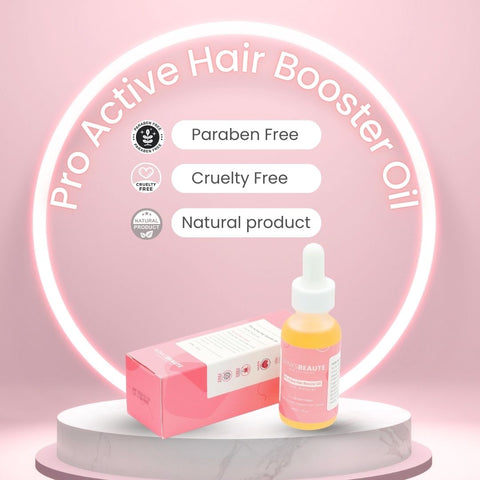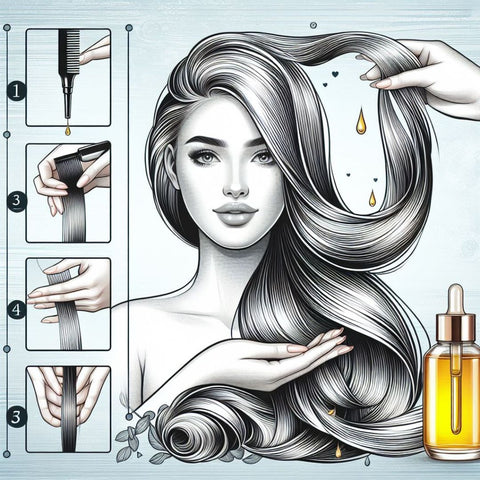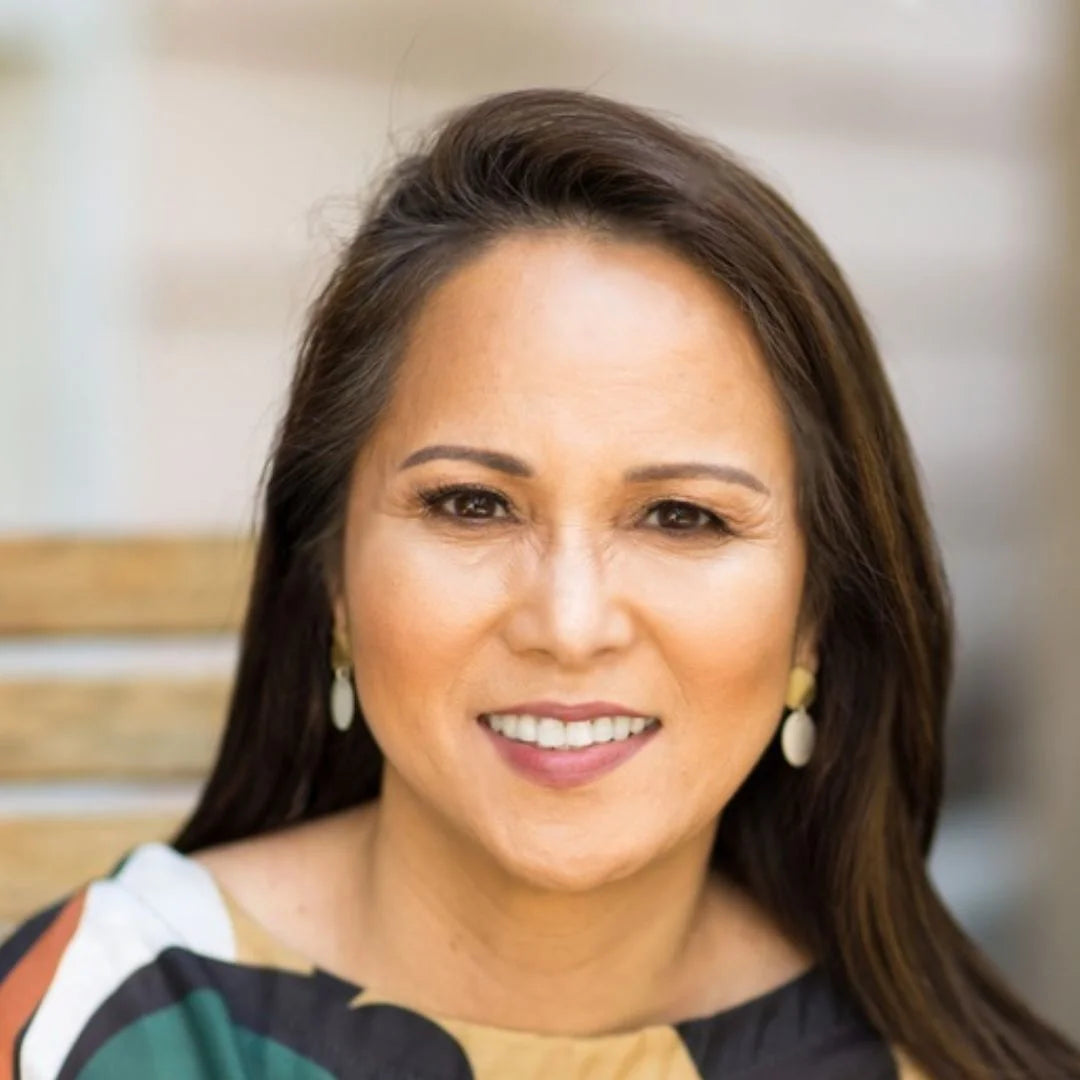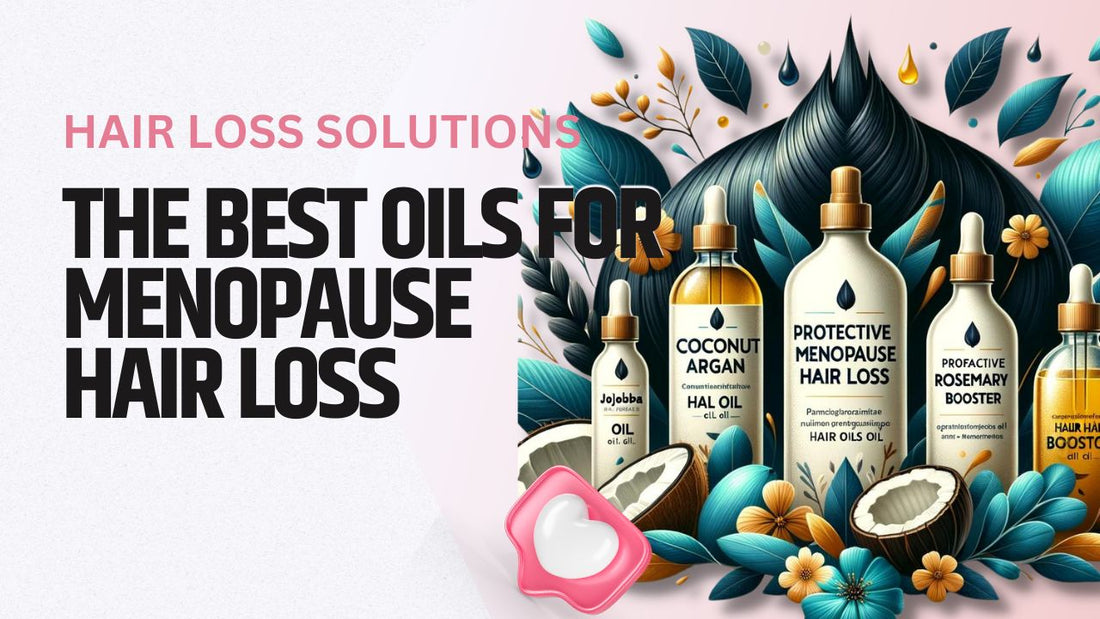
The Best Oils for Menopause Hair Loss
Share
Menopause is a natural phase in a woman's life, bringing about profound hormonal changes that can impact various aspects of health, including hair. Many women notice their hair thinning or shedding more during menopause, a concern that can significantly affect self-esteem and emotional well-being. However, certain natural oils have emerged as heroes in this scenario, offering nourishment, strength, and rejuvenation to hair affected by menopause. This article delves into the best oils for combating menopause hair loss, highlighting their benefits and how to effectively integrate them into your hair care routine.

Understanding Hair Loss During Menopause
Causes of Menopause-Related Hair Loss
The primary villain behind hair loss during menopause is the hormonal rollercoaster your body experiences. Estrogen and progesterone levels drop, paving the way for androgens to have a more pronounced effect on hair follicles. This hormonal imbalance can lead to hair thinning and loss, a condition that is both frustrating and disheartening for many.
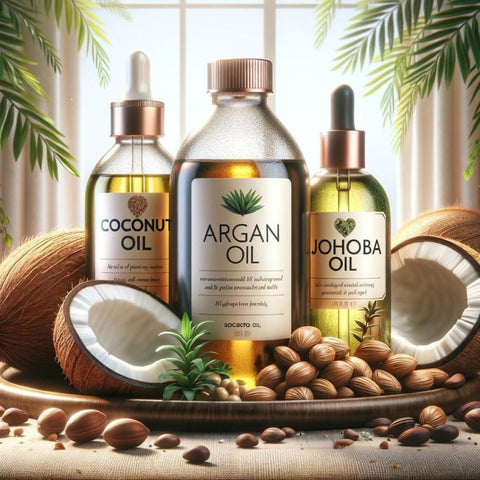
Why Oils Can Help
Natural oils can be a godsend for hair during menopause. They not only nourish and moisturize the scalp and hair but also contain ingredients that may balance scalp health, stimulate hair growth, and protect hair from damage. By incorporating certain oils into your hair care routine, you can address some of the root causes of menopause-related hair loss.
Let's start our journey through the best oils for menopause hair loss with a focus on coconut oil, renowned for its deep moisturizing properties and ability to strengthen hair from within.

Coconut Oil for Menopause Hair Loss
Coconut oil is a powerhouse of nourishment for the hair, especially during menopause when hair becomes more susceptible to damage and dryness. Rich in fatty acids, it penetrates the hair shaft, providing deep moisture and preventing protein loss from the hair. This can be particularly beneficial for menopausal hair, as it helps maintain hair's density and strength.
Benefits of Coconut Oil:
- Deeply moisturizes hair and scalp.
- Prevents hair breakage and split ends.
- Stimulates hair growth by protecting the hair root from damage.
How to Use Coconut Oil:
- Warm the coconut oil slightly.
- Massage it into your scalp and through your hair.
- Leave it on for at least 30 minutes or overnight for deep conditioning.
- Wash out with a gentle shampoo.
Integrating coconut oil into your hair care routine can significantly contribute to healthier, stronger hair during menopause. Its protective properties against hair protein loss make it an essential oil for combating hair thinness and brittleness.
As we explore further other beneficial oils like argan and jojoba and delve into the specifics of Proactive Rosemary Hair Booster Oil, we aim to equip you with a comprehensive understanding of how these natural solutions can support your hair health through menopause.

Top Oils for Menopause Hair Loss
Argan Oil
Argan oil, often referred to as ‘liquid gold,’ is extracted from the kernels of the argan tree native to Morocco. It's renowned for its moisturizing properties and rich content of antioxidants, vitamin E, and essential fatty acids.
Benefits of Argan Oil:
- Nourishes the scalp, promoting a healthy environment for hair growth.
- Protects hair from daily damage by environmental factors and styling.
- Adds shine and softness to the hair, reducing frizz and dryness.
How to Use Argan Oil:
- Apply a few drops to your hands and massage into the scalp and hair.
- Use as a leave-in conditioner by applying to damp hair before styling.
- Add to your regular shampoo or conditioner for an extra moisture boost.

Jojoba Oil
Jojoba oil is a liquid produced in the seed of the Simmondsia chinensis plant, native to southwestern North America. Its composition is similar to sebum, the oil naturally produced by our scalp, making it an excellent choice for balancing oil production and hydrating the hair and scalp.
Benefits of Jojoba Oil:
- Helps control sebum production, reducing the chances of scalp issues.
- Moisturizes the scalp and hair without leaving a greasy residue.
- Strengthens hair fibers from the inside, preventing hair breakage and loss.
How to Use Jojoba Oil:
- Warm a few drops in your hands and massage into the scalp to boost circulation.
- Apply to the ends of damp hair to seal in moisture and prevent split ends.
- Mix with your favorite conditioner for an extra dose of hydration.
Proactive Rosemary Hair Booster Oil
Moving on to a specialized blend designed to address menopause hair loss directly, the Proactive Rosemary Hair Booster Oil stands out for its targeted approach. This unique formulation combines rosemary oil, known for its ability to stimulate hair growth and improve scalp health, with other beneficial oils, offering a holistic solution to hair thinning and loss.
Why Choose Proactive Rosemary Hair Booster Oil?
- Specifically formulated to combat hair loss associated with hormonal changes.
- Contains natural ingredients proven to nourish the scalp and promote hair growth.
- Easy to integrate into your existing hair care routine for consistent use.
How to Use Proactive Rosemary Hair Booster Oil:
- Apply a small amount directly to the scalp and massage gently to increase absorption.
- Leave on overnight for an intensive treatment, washing out with a gentle shampoo in the morning.
- Use regularly as part of your hair care routine for best results.
Integrating these oils into your daily hair care can provide essential nutrients and support needed during menopause, contributing to healthier, stronger hair.
As we conclude our guide on the best oils for managing menopause-related hair loss, it's important to reflect on the personal nature of this journey. Each individual's hair and scalp have unique needs, and what works for one person may not work for another. However, the success stories of numerous women who have navigated this path before us offer hope and direction.
Success Stories: Real Results
The transformative power of incorporating oils into one’s hair care routine during menopause is well-documented in countless success stories. Women from various backgrounds report significant improvements in hair texture, strength, and growth after regular use of oils like coconut, argan, jojoba, and especially the Proactive Rosemary Hair Booster Oil. These testimonials highlight not just the physical benefits of such treatments but also the boost in confidence and well-being that comes with taking control of one’s hair health.
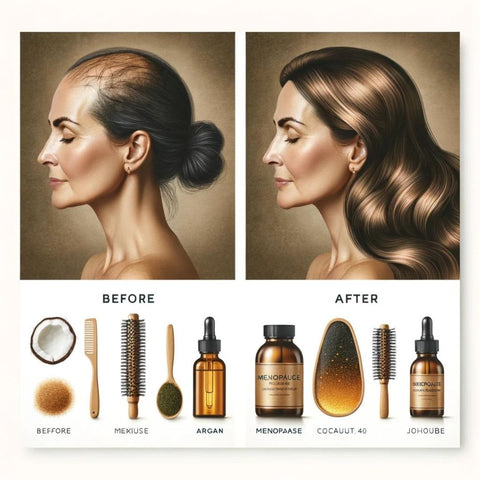
Making the Right Choice for Your Hair
Choosing the right oil for your hair care routine during menopause involves understanding your hair's specific needs and experimenting with different oils to see what works best. Consider the following tips:
- Assess your hair type and needs: Dry, brittle hair may benefit more from deeply moisturizing oils like coconut or argan, while oily scalps might respond better to jojoba oil.
- Start with small amounts: Oils are potent; a little goes a long way. Begin with a few drops to see how your hair reacts.
- Be consistent: Like any hair care treatment, oils provide the best results with regular use. Incorporate them into your routine for several weeks before evaluating their effectiveness.
Frequently Asked Questions
How often should I use these oils in my hair care routine?
It depends on your hair type and the specific oil, but generally, 1-2 times per week is a good starting point for most treatments.
Can I use these oils if I have fine or oily hair?
Yes, but you may want to focus on lightweight oils like jojoba or argan and apply them mainly to the ends of your hair to avoid weighing it down.
Are there any side effects to using hair oils?
Natural oils are generally safe for most people. However, if you have sensitive skin or scalp conditions, it's best to patch test a small amount or consult with a dermatologist.
Can hair oils alone reverse menopause-related hair loss?
While hair oils can significantly improve hair health and appearance, they are most effective when used as part of a comprehensive approach that includes diet, stress management, and possibly medical treatments for underlying conditions.
Empowered Steps Forward
Navigating hair loss during menopause can be challenging, but armed with the right knowledge and tools, it's a journey that can lead to renewed hair health and personal growth. By exploring the benefits of natural oils and integrating them into your hair care routine, you open the door to not just healthier hair, but also to a deeper connection with your body and its needs during this transformative phase of life. Remember, the key to success lies in patience, experimentation, and self-care, allowing you to emerge from this experience feeling empowered and rejuvenated.

